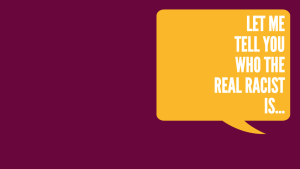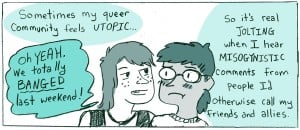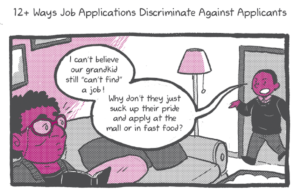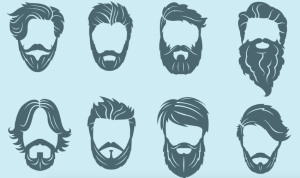With the popularity of Orange Is the New Black and Caitlyn Jenner’s highly visible coming out process, the feminist Internet-o-sphere is full to the brim these days with 101 articles explaining trans people to non-trans people.
They all address the same concepts – what’s in our pants (and why it’s rude to ask about that), sexuality versus gender identity, “trapped in the wrong body” narratives, and terminology semantics. And all of that is great!
The more information swirling around out there, the better, and there are millions of people who need articles like these.
What I don’t see, however, is the next step: a way to bridge the gap between well-meaning people who cheer for Laverne Cox and know not to ask about “the surgery,” but who want to more deeply understand what the life of a trans person is like – in short, to better understand our journeys.
I have many friends and family members who jump at the chance to ask me more complicated questions than “what pronouns do you use” because the information available to them only covers a small portion of trans lives and experience, and they are thirsty to know more.
This is an immensely complicated topic – marginalized people should never bear the burden of educating their oppressors.
But in order for a more free and positive information exchange, I believe that those of us who are comfortable “opening up the floor” to questions from cis people should do so, and further the trickle of information between the trans and cis communities.
Because I know that I enjoy a relatively privileged position as a trans person and within the trans community – masculine, white, living in a queer- and trans-friendly city, I consider it an honor to open myself up to questions so that my less privileged trans siblings can benefit from the acceptance that (hopefully) follows knowledge.
I can make assumptions about what cis people don’t know based on the ignorant comments I get from the least informed among us, but that involves overlooking the fact that understanding of trans issues is incomplete even among people who already know the basics.
I’m an openly trans writer on the internet; most people who know me understand that they shouldn’t demand that trans people describe their genitals. But gender identity is a complex and rich topic – much too varied and broad to be reduced to a simple story of pronouns and genitals and legal discrimination.
So I asked the cis people in my life, “What do you still want to know? What do you want to learn more about? What have you had explained to you, but still can’t wrap your mind around?”
It has always been my belief that understanding is the first step on the road to changing minds and hearts. Anyone who’s ever tried to change someone’s mind, though, knows that the work doesn’t stop with one conversation. It takes engaging over and over again to help some people understand.
So here’s some next-level information, to keep the conversation going, but before I dive in, the most important thing to remember when learning about trans bodies is to seek out a diversity of perspectives.
My feelings are entirely my own although – and this is important – what I feel and think about my trans identity will have much in common with what other trans people think and feel. That is why we are often spoken of as a community. There are commonalities among our experiences.
However, like snowflakes (and non-trans people), we are each different. Learn from me, but learn from as many other people as you can, too.
1. ‘I Know It’s Different for Everyone, But What Can and Can’t I Ask?’
You’re right. This is a really, really individual question.
Things you can (and should) ask are things that will help you make the person you are interacting with feel safe. Questions that are almost always welcome are questions related to identity such as “What pronouns do you use?” and “How do you identify?”
Some people prefer not to be asked their pronouns, so the safest thing you can do when meeting a new person — any new person, whether or not they’re trans – is offer your own pronouns and give them the space to respond if they choose.
If you’re in a position of power – a boss, or a parent, or a teacher – do ask how you can make the trans person feel comfortable and respected.
At this point in my life, I am personally not thrilled by any probing questions about my body, but I recognize that it’s difficult for people to learn without asking questions.
That said, I prefer when people have a relationship with me before asking about my body.
Sometimes I’ll answer questions from people I don’t know very well, but that’s mainly because I’ve been socialized to be accommodating – just because I answer a question you’ve asked me doesn’t mean I’m thrilled that you asked. Check in, please.
Don’t overthink it. There’s no objective threshold for when is too soon to ask questions.
It’s likely that you’ll get clues that someone feels comfortable around you (like, in my case, complaining about cramps or letting you watch me inject myself with testosterone), at which point they are more likely to be open to questions.
Don’t ask questions with an agenda. Ask because you really want to know, not because you want to argue.
Other trans writers have addressed issues of etiquette. Do read at least a few different perspectives on what will fly and what won’t – but always ask before grilling someone on their gender identity, and always keep a weather eye on the situation to make sure you aren’t putting anyone on the spot.
2. ‘What Do You Mean You Didn’t Transition?’
I use both “they” and male pronouns, and I haven’t “transitioned” – I have medically altered my body in some ways, and I have altered my “social gender” by dressing and carrying myself differently, but I’m not a particularly binary trans person.
I didn’t clearly “flip” from female to male in a way that separates my past starkly from my present.
This is one example of trans experience but there are as many “transition stories” as there are people who transition. Janet Mock uses the word transition to describe her story here, but takes issue with some of the language used to describe her as a youngster, leading me to my next question:
3. ‘What Pronouns Should I Use When I Talk About You Pre-Transition (Or Pre-Change-of-Gender-Presentation)?’
This, like asking people about their bodies, is highly individual.
What is considered best by much of the trans community right now is to always use pronouns consistent with the pronouns the person uses currently.
Amelia of Entirelyamelia.com discusses several reasons that this is good practice, including continuity of identity, and the fact that it can be dangerous to “out” a trans person as trans.
I think of myself as having once been a little girl, but I am uncomfortable with other people referring to me as a girl because I don’t know what assumptions they are attaching to the word girl.
So, when referring to me in the past, I prefer gender neutral pronouns, like they, or the avoidance of pronouns altogether.
Mock also prefers that pronouns and gendered words consistent with her identification as a woman be used to describe her. “My genital reconstructive surgery did not make me a girl,” she explains ”I was always a girl.”
There are always exceptions to rules about how to talk about someone’s identity, though, so the cardinal rule applies: Ask, ask, ask!
4. ‘What Do You Mean You’re Trans, But Don’t Identify as Male or Female?’
This has been covered here and here and here and here, but my own, personal answer is that there are many very important ways in which I identify as a guy, but I feel the pull of queer female culture like an umbilical cord – something that’s still nourishing me as a person, despite my masculine gender identity.
Some trans men medically or socially transition and fly away into their gorgeous new American masculinities like manly butterflies, cheerfully leaving behind the cocoon of queer girl culture. That’s one of many equally valid ways to be trans – but it’s not my experience.
I’m a little more like the goo caterpillars turn into before they become butterflies. I’m not totally one or the other, but I’m definitely a “nutrient-rich soup.”
Identity politics in the queer and trans world are extremely complex, but the important thing to remember as an outsider learning about queer and trans culture is that while everyone gets to choose how they identify, everyone is also responsible for recognizing when they need to sit down or stay out.
I may feel connected to queer girl culture, but that doesn’t give me an all-access pass to queer female spaces.
Since I started publicly identifying and presenting as masculine-of-center, I have maintained my ties to the queer female culture that I belonged to for much of my life, but I have begun to pay a lot of attention to how much physical and metaphorical space I take up.
Some queer female communities consider trans and non-binary identified masculine folks to be community members, and some do not.
It’s my responsibility as a masculine of center person to make sure I’m not intruding where I’m not wanted, and also to be suspicious of any queer female space that welcomes me but excludes trans women.
5. ‘Do You Like Girls Because You’re a Lesbian or Do You Like Girls Because You’re a Straight Boy?’
I think the answer to this question for me is a little bit of both (though please keep in mind this does not apply to every trans person across the board).
I can’t separate my sexual desire from the cultural construction of “lesbian” – meaning a female-identified person who exclusively dates or sleeps with female-identified people.
I also grew up identifying as a lesbian, dating other lesbians, and bonding with other queer women in queer circles.
However, there’s something that feels very straight to me about my sexual habits.
Sexuality, to me, is more complex than just who you sleep with.
My sexuality is queer in that I operate in a world of queer women, and I date women. But when it comes down to the actual sex, I’d say it feels pretty straight.
6. ‘How Specifically Does One Initially Ascertain or Recognize Being Trans?’ (Or ‘How Did You Know?’)
Because my masculine body feels like home more than my more feminine body ever did. Because I like the way men’s clothes feel and look on me. Because I like looking in the mirror and seeing glimpses of manhood. Because I like being teased about being boyish.
Because right now, with my boobless body in my dorky khaki shorts, texting my friends moaning about how expensive male formalwear is I’ve got 99 problems but feeling uncomfortable in my skin ain’t one.
This question has as many answers as there are flavors in a San Francisco ice cream parlor.
7. ‘What Do We Know About Taking Hormones and Aging (Or Over a Long Period of Time)?’
There’s some data, but not a lot.
I am constantly pushing, in my job as a healthcare worker, to collect data on trans people because there just isn’t much out there. What we do know is that testosterone is relatively safe, but we don’t know enough about it.
Most of what we know comes from studies of cis men who take testosterone, yet another reminder that trans people’s healthcare is constantly compromised by our healthcare system.
I get blood tests regularly to check my testosterone levels and to make sure my liver is functioning properly. Because testosterone is a hormone, it has the potential to affect my blood, my cholesterol, my bone density, and many other bodily systems.
For more information on the impacts of testosterone on a body with functioning ovaries, see here and here; however, a trans-informed health care provider is probably the best place to get accurate information.
The bottom line, as with any wellness-related issue, is that each person will work with their health care provider to find a solution that works for them.
***
I want to see the conversation about trans and non-binary people go beyond “What are you, anyway?”
We have, for the first time, an emerging transgender media presence – let’s take the conversation beyond what we want to be called and engage in the kind of grappling, intelligent, interesting discussions we’re capable of as an increasingly informed and accepting society.
[do_widget id=’text-101′]
Wiley Reading is a New Jersey-born artist, writer, environmentalist, and social justice advocate located in Burlington, VT. He works as a community health worker for the Greater Burlington YMCA, and writes for Disrupting Dinner Parties, a small collective feminist blog. Follow him on Twitter @wreadinggo.
Search our 3000+ articles!
Read our articles about:
Our online racial justice training
Used by hundreds of universities, non-profits, and businesses.
Click to learn more





















